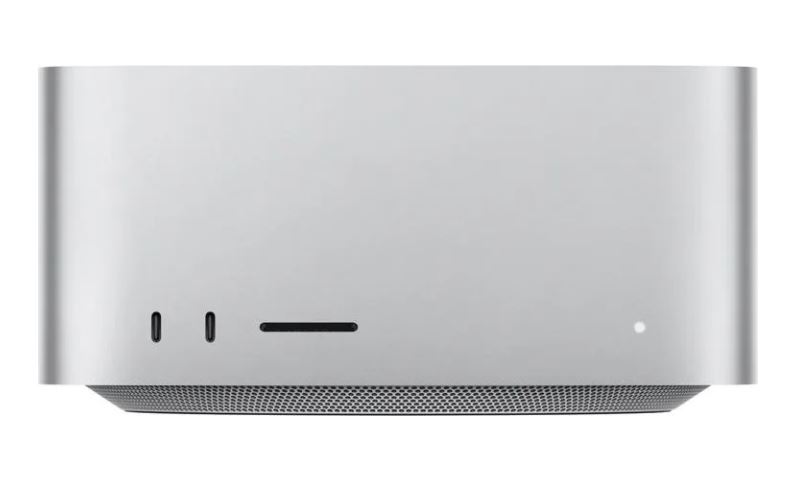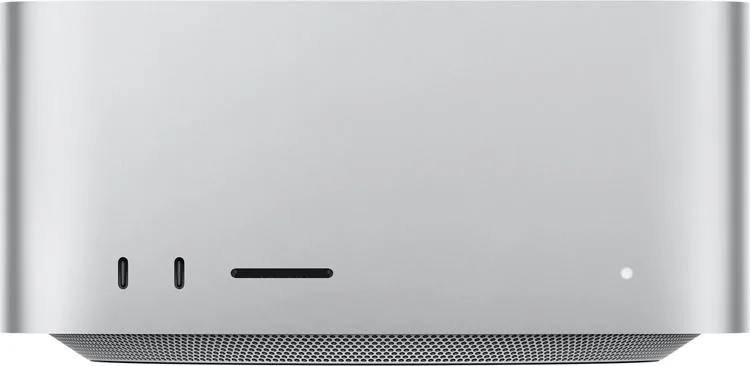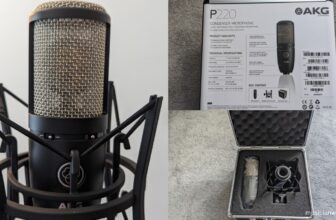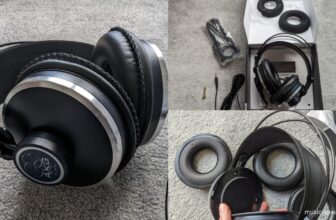The 10 Best CPUs for Music Production (2024)

CPU quality is the most important tech spec to focus on for music production. A high-powered chip will allow you to use many CPU-intensive plugins without grinding your DAW to a halt through crackling, audio dropouts, and crashing!
The M2 Ultra Chip is my top pick, which you can find within the powerful Apple Mac Studio. It is a processing beast for any project. While all other links in the grid are to the individual CPUs, the Apple chips can not be purchased alone.
If you’re looking to build a beast of a Windows machine. The Intel Core i9-13900K is an amazing option. Though it’s quite power-hungry, so you’re going to need a good CPU cooler. This is the CPU that I currently use, I stress-tested it in Ableton Live and it was able to run 24 CPU-heavy patches of U-he Diva without audio dropouts. Those 24 cores definitely come in handy for big projects!
My pick for tighter budgets is the AMD Ryzen 5 3600, with its budget-friendly price tag, it’s quite decent for music production, though certainly won’t perform anywhere near as well as the top picks.
Top Tip! Look out for CPUs with a lot of cores. Most DAWs like Ableton Live, Logic Pro, and Pro Tools all benefit from multi-treading. That means that they can make use of multiple CPU cores at once. This is very good news, as it massively reduces bottlenecks processing your project and can enable you to use far more plugins at once.
Contents
- The 10 Best CPUs for Music Production (2024)
- 1. Apple M2 Ultra
- 2. Intel Core i9-13900K
- 3. AMD Ryzen 5 7600
- 4. Apple M1 Ultra
- 5. AMD Ryzen 9 7950X
- 6. AMD Ryzen 7 7700X
- 7. Intel Core i7-13700K
- 8. AMD Ryzen 7 2700X
- 9. Intel Core i5-13600K
- 10. Intel Core i3-13100
- What makes a great CPU great?
- What about RAM?
- CPU production: the two (no, wait, three!) big players
- Conclusion
The 10 Best CPUs for Music Production (2024)
Now let’s move on to the full list:
1. Apple M2 Ultra
If you have the budget and you’re looking for a hassle-free, ultra high-powered CPU using the Mac OS then the Apple M2 is an absolute no-brainer.
Apple’s M series of chips took the world by storm when they were initially released in 2020. They very quickly outperformed most Intel and AMD processors due to their more streamlined architecture. They also operate with much lower power consumption, and they generate far less heat, which is why these don’t need big CPU coolers and multiple fans like we’re used to seeing with high-end Intel and AMD chips.
Apple M2 chips were released in 2022 as the newest generation and the most powerful chip series so far. These chips, including M2, M2 Max, and M2 Ultra, all provide phenomenal performances, but like in the case of M1 chips, M2 Ultra is the most powerful one.
The standard M2 chip is better than the standard M1 chip but falls short when compared to the M1 Max or M1 Ultra. However, M2 Max and M2 Ultra are both upgrades on the M1 series. The M2 Ultra makes music production seamless with its 24-core CPU, 16-core Neural Engine, and 76-core integrated GPU. Plus, it has 24 GB of fast unified memory, compared to 16 GB of the M1 series.
The M2 Ultra can process 15.8 trillion operations in a second, which is a 40% upgrade compared to the older generation chips. If you want the best processor for your music production workflow, and if you want to process big projects with hundreds of tracks and tens of different plug-ins, the Apple M2 series would be an excellent choice. But, it must be noted if you won’t work with large projects and orchestrations with many plug-ins, this can be an overkill.
2. Intel Core i9-13900K
If you’re looking for a beastly Windows machine with a high-end CPU for music production, you can’t go wrong with the Intel Core i9-13900K, as it is the king of Intel processors for now with 24 cores.
I’ve personally used this CPU quite a lot with Ableton Live and it was able to run 24 pretty CPU-heavy patches of U-he Diva without audio dropouts!
I paired this with a Corsair iCUE H150i RGB ELITE Liquid CPU Cooler along with a case with good ventilation, which works quite well. This is a seriously power-hungry CPU and requires proper heat management.
You may have to stretch your budget, but you’ll be good for years and years to come. With a base frequency clock speed of 3.0 GHz that can be boosted up to 5.8 GHz, it should give you more than enough power to run as many samples and virtual instruments as you want.
The Intel Core i9-13900K is also great in terms of single-thread performance, which refers to the number of tasks performed by a program’s single stream of instructions during a certain period. Single-thread performance has a direct impact on a DAW’s usability.
3. AMD Ryzen 5 7600
The AMD Ryzen 5 7600 was mainly designed and marketed for video game enthusiasts, but that doesn’t mean it cannot be used by music producers. It should be able to fit the needs of more casual DAW users on the basis that you’re not pushing it too hard. The AMD Ryzen 5 7600 is a very decent option for those who don’t have the budget to spend on the higher-end CPUs.
Of course, the drawback of using a lower-end CPU means that you might need to spend more time bouncing plugin-heavy tracks to audio (or “freezing” the track like in Ableton for example). It’s a tradeoff between budget and workflow constraints in your music production.
4. Apple M1 Ultra
The original Apple M1 chip made a huge impact in 2020, boasting eight cores and a 3.2 GHz clock speed. Because it was specifically designed to be integrated into Apple devices, the M1 chip was also great in terms of efficiency. However, upgraded models of the M1 – namely, the M1 Pro, the M1 Max, and the M1 Ultra – were subsequently released in 2021 and 2022, putting the original M1 to shame.
Out of the four M1 chips, the M1 Ultra is by far the better. Arguably the best CPU for music production, it comes with a whopping 16 cores, as it comprises two combined eight-core M1 Max processors. The YouTube channel Max Tech has put the M1 Ultra to the test and came up with impressive results: Apple’s powerful processor managed to load up to 341 simultaneous Logic Pro tracks without presenting any performance issues.
The sheer power of the M1 Ultra, combined with the fact that it’s designed for Apple computers in particular (the machines of choice of most music producers), makes it one of the most commendable CPUs for music production.
5. AMD Ryzen 9 7950X
To put it simply, the AMD Ryzen 9 7950X is the AMD competitor to Intel’s Core i9-12900K. As the best AMD CPUs in the market, it comes with a 4.5 GHz base clock speed and 5.70 GHz overclocking speed along with a minimum of 16 cores (up to 32 if you want to). With a 170-watt power consumption, it’s also extremely power-efficient, especially compared to other high-quality CPUs.
This beastly processor is yet another piece of equipment that will give you all the power you need to produce music and even more. With the AMD Ryzen 9 7950X, you can relax and focus on what matters the most: coming up with great tracks, without worrying about annoying
crashes and time-consuming sample loads.
6. AMD Ryzen 7 7700X
The AMD Ryzen 7 7700X stands out as a compelling choice for music production enthusiasts. Equipped with 8 cores and 16 threads, it packs a punch when it comes to multitasking, making it a breeze to run numerous virtual instruments, effects plugins, and digital audio workstations (DAWs) concurrently.
What’s particularly appealing is its compatibility with both DDR4 and DDR5 RAM, depending on the motherboard, enabling rapid data access, which is crucial for handling large audio files and expansive sample libraries. With support for PCIe 4.0, it provides snappy data transfer speeds, further enhancing your music project management.
While it lacks integrated graphics, this processor delivers strong value for musicians and audio producers, offering impressive performance in music production tasks. Its combination of core count and clock speeds ensures a fluid and efficient workflow, making the Ryzen 7 7700X a noteworthy choice for those seeking a cost-effective yet powerful solution for their music production needs.
7. Intel Core i7-13700K
The Intel Core i7-13700K is an ideal choice for music production due to its exceptional performance features. With its 8 powerful P-cores and 8 efficient E-cores, it excels in multitasking, handling real-time audio processing, synthesizers, and audio effects effortlessly. Be it video editing, content creation, or large audio production projects, this chip can handle it easily.
The chip works with a 3.5 GHz base speed and 5.4 GHz max frequency, making it perfect for managing large audio files and sample libraries. While its integrated graphics may not be a primary concern, they can be useful for visual elements and multi-monitor setups in music software. Overall, the i7-13700K offers top-notch performance for music production tasks, earning it high praise in this context.
8. AMD Ryzen 7 2700X
While clock speed isn’t everything regarding CPUs, it’s still impressive that the AMD Ryzen 7 2700X runs at a base clock speed of 3.7 GHz. The 20 MB CPU cache is equally impressive, as well as the fact that the AMD Ryzen 7 2700X can convincingly operate on a PC with relatively low RAM. This is not one of the latest models, but it shines with its performance for price ratio, which is still amazing after many years.
It features eight cores and is described as a “high-speed” processor, which makes it an ideal piece of hardware for music producers. It’s not the best AMD Ryzen CPU on the market, but it offers one of the best price-quality ratios.
9. Intel Core i5-13600K
Music production can get expensive, especially when you consider the costs of buying every music-production tool you’ll need to record, edit, and mix music at home. For this reason, it’s important to keep the Intel Core i5-13600 in mind. It’s comparatively affordable without missing out on performance.
While working inside a DAW software can push some processors to the limit, an Intel Core i5-13600 should be more than enough to produce most tracks, admitting you’re not working on a megalomaniac music project. The 3.5 GHz clock and 5.1 Ghz max speed, as well as 24 MB CPU cache along with 20 processor threads, all features are just good enough for performing pretty much any DAW-related tasks.
10. Intel Core i3-13100
The Intel Core i3-13100 is yet another great CPU that can be installed on your everyday desktop, which is great for saving some money. What makes it ideal for music production? In addition to a 3.4 GHz clock speed and 4.5 Ghz max frequency rate along with 4 to 8 core threads, the Intel Core i3-10100 comes equipped with i3 processing.
Developed by Intel, i3 processing is a family of 64-bit CPUs designed to be installed in entry-level computers. This means they’re compatible with pretty much any mainstream machine, ensuring anyone can have access to a state-of-the-art CPU.
What makes a great CPU great?
The quality of a CPU matters for music production because it has a crucial impact on a computer’s performance and audio processing. If you’re making music inside a computer, working with a high-quality CPU can result in a fast workflow, low latency, lower track limitations, and far fewer program crashes.
As a music producer, you want to focus on creating music first and foremost; not on your computer’s performance. To avoid frustration, it’s important to choose the right processor for making music.
CPUs have been around pretty much for as long as computers have existed, and they have evolved extensively throughout the years. In the old days of single-processing units (before the democratization of dual-core processors), clock speed was the determining factor to evaluate the quality of a CPU.
Today, though, much has changed. Depending on computer architecture, CPUs with higher clock speeds can be outperformed by more recent processors with lower clock speeds. This shows that choosing the best CPU is not as black-and-white as going for the hardware with the most gigahertz (GHz).
Four vital components should be considered when selecting the best CPU: clock speed, number of performance cores, CPU cache, and power consumption.
1. Clock speed
Clock speed is the number of cycles executed by a CPU per second. Clock speed is measured in GHz, which means that a 3 GHz CPU runs at 3 billion cycles per second, a 4.5 GHz CPU runs at 4.5 billion cycles per second, and so on. Clock speed is crucial for determining a processor’s quality because it affects the speed of every computer process.
2. Number of cores
You have certainly heard the expressions “dual-core CPU” and “quad-core CPU,” but what does this mean? To put it simply, a 3 GHz dual-core CPU is a CPU that has two processing units, each with a clock speed of 3 GHz. Currently, commercially available computers tend to have between two and six cores. Because multicore processors can perform various tasks simultaneously, a greater number of cores translates into greater CPU efficiency.
3. CPU cache
The CPU cache is used by the processor to store data and program instructions more efficiently. This component is very important for music production because it’s responsible for speeding up repeated processes – the better the CPU cache, the faster you can execute routine tasks inside your DAW.
A CPU cache is divided into three cache-memory “levels,” known as L1, L2, and L3. L1 is directly built into the processor and measured in kilobytes, while L2 and L3 are located outside the CPU chip core and measured in megabytes.
4. Power consumption
Power consumption is simply the amount of power (measured in watts) required to operate a processor. A quad-core CPU should have a power consumption of fewer than 140 watts, while a slower dual-core CPU should have a power consumption of about 65 to 85 watts.
What about RAM?
You don’t need to understand a lot about technology to know that random access memory (RAM) is important for producing music on the computer. Most DAW-related crashes originate from RAM issues. But while RAM is crucial to determine the quality of a computer’s performance, it is not part of a computer’s CPU.
CPU and RAM work in conjunction to deal with any computer task. While the CPU is the main processing unit, the RAM is the temporary memory storage unit. This means that the RAM’s function is to handle all the active, short-term tasks in the processor.
CPU production: the two (no, wait, three!) big players
Getting a high-quality processor used to be a no-brainer: before competition arrived, Intel was the gold standard. To be fair, Intel continues to be a huge player today, providing excellent CPUs at a relatively high cost. However, AMD has stepped into the picture, at least since the release of its powerful Ryzen series, which is more accessible and (sometimes) as powerful as Intel’s hardware.
Intel and AMD topped the market for a long time, developing CPUs for brands as renowned as Dell, HP, and ASUS. However, Apple (which used to rely on Intel Xeon CPUs) introduced its game-changing processor in 2020. It’s called the M series, and they top the list of the best CPUs for music production that you can find above. In 2022, the new series called the M2 chips came into play, beating the M1 chips of 2020 and becoming the most powerful processor series to date.
Conclusion
All the CPUs listed above should give you more than enough power to run your favorite DAW, be it logic pro or ableton Live, without experiencing any issues. But that doesn’t mean you need a state-of-the-art processor to come up with great tracks. A high-cost CPU for music production is recommendable if you’re looking to improve your workflow and forget processing problems for good.
If you’re just starting, you should consider investing your funds in music-production equipment first (everything from a good audio interface to a nice microphone) and only later look for a high-performance CPU. To convincingly make music on a computer, you just need the basics: if you have a 64-bit system with a 2.4 GHz quad-core processor and a minimum of 4 GB RAM, you should be fine.
My top pick, the M2 Ultra Chip is the most powerful CPU chip right now that can serve you for a long time, making your music production flow insanely fast and smooth.
If you want to work on Windows and spend less, AMD Ryzen 5 3600 would be a great choice as it can handle almost any small to mid-large-scale audio production projects without any problem. Otherwise, if you have a higher budget, the Intel Core i9-13900K is an incredibly capable CPU.















